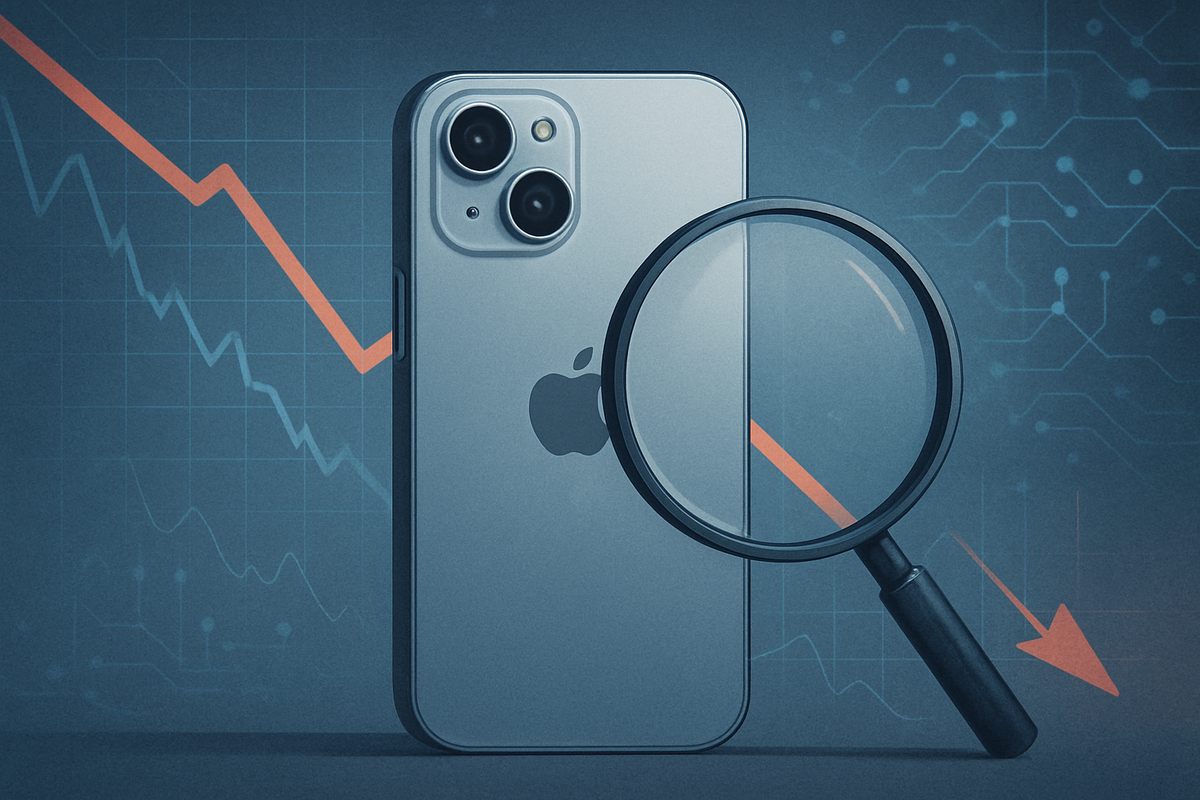Financial News
Apple Faces Scrutiny as Jefferies Issues Multiple Downgrades Amid Muted iPhone and AI Expectations

In a series of significant moves over the past year, investment bank Jefferies has repeatedly downgraded Apple (NASDAQ: AAPL), citing concerns over what it perceives as overly optimistic market expectations for upcoming iPhone models and the near-term impact of artificial intelligence features. These downgrades, which occurred in October 2024, January 2025, and most recently in May 2025, have sent ripples through the market, highlighting a cautious outlook on the tech giant's immediate growth prospects and its ability to innovate in a rapidly evolving landscape.
The core of Jefferies' bearish stance centers on the belief that the iPhone 16 and 17 may not deliver the groundbreaking features or substantial AI capabilities needed to drive significant unit growth, thereby failing to meet elevated market forecasts. This skepticism challenges the prevailing bullish sentiment surrounding Apple and underscores a pivotal moment for the company as it navigates intense competition and the high expectations associated with its flagship product line.
Jefferies' Bearish Stance: A Timeline of Downgrades and Rationale
Jefferies' critical assessment of Apple has unfolded over several months, marking a notable departure from the generally optimistic analyst consensus. The timeline began on October 7, 2024, when Jefferies first downgraded Apple from a "Buy" to a "Hold" rating. While the price target was slightly raised at this juncture, the change in rating signaled emerging concerns. These concerns intensified, leading to a more aggressive downgrade on January 20-21, 2025, from "Hold" to "Underperform," accompanied by a cut in the price target. The most recent downgrade occurred on May 2, 2025, where analyst Edison Lee reiterated the "Underperform" rating, adjusting the price target to $170.62.
The primary driver behind these successive downgrades has been Jefferies' cautious outlook on iPhone sales and the perceived delay in substantial AI integration into Apple's hardware. Analyst Edison Lee specifically highlighted that market expectations for the iPhone 16 and iPhone 17 were "premature," anticipating a lack of significant new features or transformative AI capabilities in these models. Jefferies projected "flattish volume growth" for the iPhone 16 compared to its predecessor in the second half of calendar year 2024, with only a modest 2.5% growth in its lifecycle volume. Lee further emphasized that current smartphone hardware requires "rework before being capable of serious AI," suggesting that while Apple Intelligence is a positive long-term development, its immediate impact on sales for the iPhone 16 and 17 would be limited, with more substantial advancements not expected until 2026 or 2027. Beyond product-specific concerns, broader weaknesses in the consumer electronics market and soft demand from key regions like China, as noted by JPMorgan, also contributed to the negative outlook.
Initial market reactions to these downgrades were discernible, with Apple's stock experiencing declines following each announcement. The January 2025 downgrade, in particular, saw Apple shares fall by approximately 3.5% on the day, contributing to a nearly 12% loss for the stock in the early part of 2025. Jefferies' "Underperform" rating stood out as a rare bearish call amidst a sea of "Buy" ratings from other Wall Street firms, indicating a significant divergence in expert opinion and underscoring the weight of their analysis.
Potential Winners and Losers in a Shifting Landscape
Jefferies' cautious stance on Apple's (NASDAQ: AAPL) near-term iPhone performance and AI integration could create a ripple effect across the technology sector, impacting various companies from direct competitors to supply chain partners. For Apple itself, the immediate consequence of these downgrades is increased investor skepticism and potential pressure on its stock price if iPhone sales indeed underperform market expectations. While Apple's robust ecosystem and brand loyalty provide a strong foundation, any sustained period of muted innovation or sales growth in its flagship product could challenge its premium valuation and market leadership. The company's ability to demonstrate compelling AI advancements in future hardware iterations will be crucial to regaining investor confidence.
On the competitive front, a perceived stumble by Apple could open doors for rivals. Companies like Samsung Electronics (KRX: 005930), Google (NASDAQ: GOOGL) with its Pixel line, and Chinese manufacturers such as Huawei and Xiaomi (HKG: 1810) could potentially gain market share if Apple's upcoming iPhones fail to excite consumers. These competitors, many of whom are aggressively integrating AI features into their devices and focusing on diverse price points, could capitalize on any hesitation among consumers to upgrade to new iPhones. For instance, Samsung's early adoption of on-device AI features in its Galaxy S series might be seen as a more immediate value proposition for consumers eager for AI-powered experiences.
The semiconductor and component suppliers that form Apple's vast supply chain also face potential implications. Companies like Taiwan Semiconductor Manufacturing Company (NYSE: TSM), which manufactures Apple's custom silicon, and various memory and display manufacturers, could see their order volumes affected if iPhone production forecasts are revised downwards due to weaker demand. Conversely, if competitors gain ground, suppliers to those companies might see an uptick in orders. The broader AI chip market, including players like NVIDIA (NASDAQ: NVDA), could also see shifts in demand as smartphone manufacturers race to integrate more powerful neural processing units (NPUs) into their devices, potentially benefiting those with versatile AI hardware solutions that can cater to multiple OEMs.
Broader Implications and Industry Trends
The Jefferies downgrade of Apple transcends a mere analyst call; it taps into broader industry trends and highlights critical junctures for the smartphone market and the burgeoning field of artificial intelligence. This event underscores the increasing difficulty for even market leaders like Apple to consistently deliver "game-changing" innovations year after year, especially in a mature smartphone market. The "supercycle" phenomenon, driven by significant technological leaps, appears to be less frequent, demanding that companies find new avenues for growth and differentiation.
The core of Jefferies' argument—that current smartphone hardware needs "rework before being capable of serious AI"—resonates with a wider industry debate about the true readiness of consumer devices for advanced on-device AI. While many companies are touting AI features, the practical, transformative applications that genuinely drive upgrade cycles are still in their nascent stages. This suggests a potential "AI disillusionment gap" where market expectations outpace current technological capabilities, impacting not just Apple but all smartphone manufacturers. The ripple effect could extend to the entire tech ecosystem, influencing investment in AI startups, the development of AI-optimized hardware, and the strategic roadmaps of software developers. Regulatory bodies might also begin to scrutinize claims around AI capabilities more closely, particularly concerning data privacy and algorithmic bias, as these features become more pervasive.
Historically, analyst downgrades of major tech companies have often served as inflection points, sometimes preceding periods of stock underperformance or prompting strategic shifts. For instance, similar concerns about innovation cycles and market saturation have impacted other tech giants in the past, forcing them to diversify revenue streams or aggressively pursue new product categories. The current situation with Apple can be compared to periods where companies like Microsoft (NASDAQ: MSFT) or IBM (NYSE: IBM) faced questions about their future growth engines, leading to significant transformations in their business models. The Jefferies downgrade, therefore, serves as a bellwether, signaling that the market is increasingly demanding tangible, impactful AI integration rather than incremental updates, and that companies relying on hardware sales alone face growing headwinds.
The Road Ahead: Navigating Innovation and Market Expectations
Looking ahead, Apple (NASDAQ: AAPL) faces a critical period where its strategic decisions regarding product development and AI integration will dictate its short-term performance and long-term market position. In the short term, the company will need to manage market expectations surrounding the iPhone 16 and 17 launches. Should these devices indeed offer only incremental updates without significant AI breakthroughs, Apple may need to focus on its services ecosystem, supply chain efficiencies, and global market penetration to sustain revenue growth. Aggressive marketing campaigns highlighting existing ecosystem benefits and subtle improvements could also play a role in mitigating the impact of potentially muted hardware upgrades.
In the long term, the path forward for Apple appears to hinge on its ability to deliver on the promise of "serious AI" in its hardware, as suggested by Jefferies. This could necessitate significant strategic pivots, potentially involving deeper investments in AI research and development, acquisitions of AI-focused startups, or even a re-imagining of its hardware architecture to better accommodate advanced on-device AI capabilities. The timeline of 2026-2027 for such advancements, as noted by Jefferies, suggests that the market will be closely watching for signs of these foundational changes in Apple's product roadmap. This also presents market opportunities for companies specializing in AI hardware, software, and services that can partner with Apple or its competitors to accelerate these developments.
Potential scenarios and outcomes range from a continued period of stock underperformance if Apple fails to meet AI expectations, to a resurgence if the company unveils truly transformative AI-powered devices in the coming years. A key challenge will be balancing the need for groundbreaking innovation with the practicalities of mass production and market readiness. Investors should watch closely for Apple's upcoming earnings calls for insights into management's outlook on iPhone sales, AI strategy, and capital allocation. Any announcements regarding new partnerships, significant R&D expenditures in AI, or changes in product launch cycles will be crucial indicators of the company's strategic direction.
Comprehensive Wrap-Up: A Pivotal Moment for Apple
The series of downgrades by Jefferies on Apple (NASDAQ: AAPL) over the past year marks a pivotal moment for the tech giant, underscoring the escalating demands for innovation in both the mature smartphone market and the rapidly evolving field of artificial intelligence. The core takeaway is that market expectations for incremental iPhone updates are diminishing, and investors are increasingly looking for substantial advancements, particularly in AI, to justify premium valuations and drive future growth. While Apple's robust brand and ecosystem remain formidable strengths, the concerns raised by Jefferies highlight a potential gap between current product capabilities and the ambitious AI-driven future envisioned by the market.
Moving forward, the market will be keenly assessing Apple's ability to navigate this challenging landscape. The coming months will be crucial as the company prepares for future iPhone launches and provides more clarity on its long-term AI strategy. Investors should pay close attention to any indications of significant hardware re-architecture, strategic partnerships in the AI space, or shifts in its product development cycles that could signal a more aggressive push towards on-device AI. The success of these initiatives will not only determine Apple's stock performance but also its continued leadership in the global technology arena.
Ultimately, Jefferies' analysis serves as a powerful reminder that even the most dominant companies are subject to rigorous scrutiny, and sustained innovation is paramount in maintaining market leadership. The questions raised about iPhone expectations and AI readiness will undoubtedly shape Apple's narrative for the foreseeable future, making the next few years a critical test of its adaptability and pioneering spirit.
This content is intended for informational purposes only and is not financial advice
More News
View More




Recent Quotes
View More
Quotes delayed at least 20 minutes.
By accessing this page, you agree to the Privacy Policy and Terms Of Service.



